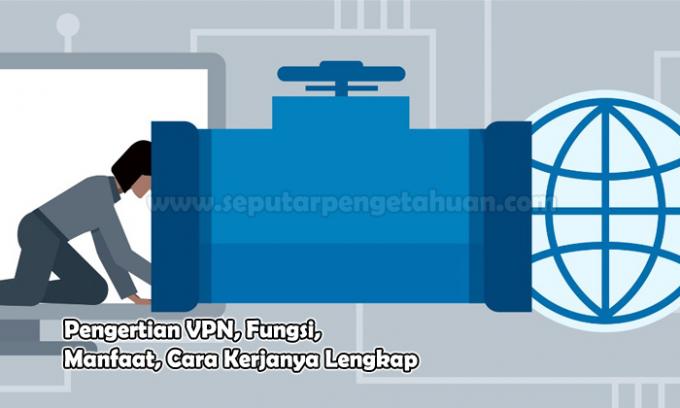Understanding VPN, Functions, Benefits, How it Works Completely
Understanding VPN, Functions, Benefits, How it Works Complete – In this discussion, we will discuss about VPN, which is a virtual private network. This discussion includes the understanding, functions, benefits, how it works, advantages and disadvantages of VPN.
Table of contents
-
Understanding VPN, Functions, Benefits, How it Works Complete
- What is VPN
- VPN Functions
- Confidentially
- Data Integrity (Data Integrity)
- Origin Authentication (Source Authentication)
- VPN Benefits
- How VPN Works
- VPN Pros and Cons
- Share this:
- Related posts:
Understanding VPN, Functions, Benefits, How it Works Complete
Let's review in full what a VPN is and its functions, benefits and how it works here.
What is VPN
VPN is an abbreviation for the word "Virtual Private Network" which is a connection between one network and another network privately (directly) through a "public" network. VPN uses the internet network as an intermediary medium, it can be called a connection, not directly.
Called Private Network because VPN is private, that is, only certain people can access it. Data sent via VPN is encrypted so that it is safe and confidential, even if it is sent over the internet.
By using a VPN, we seem to create a network within the network or it can be called a tunnel. Tunneling is a way of creating private paths using third-party infrastructure. VPNs use one of three existing tunneling technologies: PPTP, L2TP and the latest standard, Internet Protocol Security (IPSec). VPN is a blend of tunneling and encryption technologies.
VPN Functions
The functions of a Virtual Private Network (VPN) are:
-
Confidentially
VPN technology uses a work system by encrypting all data that passes through it. With the encryption technology, the confidentiality of a data can be more maintained. Although there are third parties who can intercept data that passes through the internet that is the VPN path itself, but not necessarily able to read the data, because the data that passes is scrambled. With the implementation of the encryption system, no one can access and read the contents of the data network easily.
-
Data Integrity (Data Integrity)
When a data passes through the internet network, in fact the data has traveled very far across various countries. By using this VPN technology, the data sent is maintained the integrity of the data starting from sending data until the data arrives at the destination. Even if the contents are disturbed, whether lost, damaged or manipulated by people who are not supposed to.
-
Origin Authentication (Source Authentication)
VPN technology has the ability to authenticate the sources that send data to be received. All incoming data will be checked and information will be taken from the data source. Then, the address of the data source will be approved if the authentication process is successful. A VPN guarantees that all data sent and received comes from the source it is supposed to be. In this case, no data is falsified or sent by other parties.
VPN Benefits
Some of the benefits of using VPN technology are:
- Remote Access: By using a VPN we can access a computer or office network, from anywhere as long as it is connected to the internet or a public network.
- Security: With a VPN connection we can browse, search safely when accessing the virtual world or public internet networks such as hotspots, wifi in cafes.
- Save on network setup costs: VPN can also be used as an alternative way to connect a fairly large local network at a lower cost. Because the data transmission used in the VPN uses the internet network media or a public network that previously existed without the need to build your own network.
How VPN Works
How VPN technology works is
- VPN supports many network protocols such as PPTP< L2TP, IPSec and SOCKS. This protocol helps the VPN work in the authentication process.
- VPN clients can establish connections and identify authorized people on the network.
- The VPN network is also encrypted which increases security features, meaning that the VPN is usually invisible on larger networks.
- Today's technological developments are largely based on VPNs because of the mobility it provides and nowadays VPNs are also paving the way for Wi-Fi connections and private wireless networks.
VPN Pros and Cons
The advantages and disadvantages of a VPN are as follows:
Pros of VPN
- VPN is an effective solution for large business organizations with dedicated network facilities
- Increase organizational mobility by directly connecting the home network or mobile workers to the organization.
- Security features can be customized
- Remote connectivity, file sharing, video conferencing
Disadvantages of VPN
- VPNs require extra care to establish a clear security system. This is because sensitive company information can be accessed globally. Therefore the safety factor is a risk in itself.
Thus it has been explained about Understanding VPN, Functions, Benefits, How it Works Complete Hopefully it can add to your insight and knowledge. Thank you for visiting.
Also Read:8 Understanding Databases According to Experts, Types, Functions & Benefits

